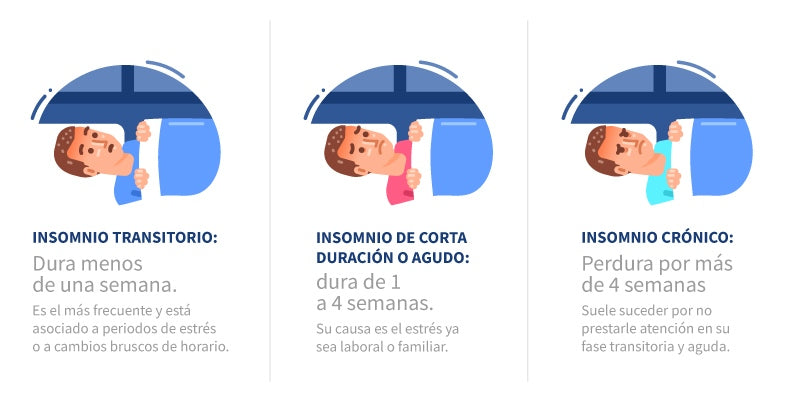The perfect formula to sleep through the night

If you spend sleepless nights brooding over your worries and wake up feeling like you haven't rested, here's the perfect formula for sleeping through the night.
Let me tell you that you are not the only one. Studies show that insomnia affects more than 50% of the world's population and worsens over the years.
But don't worry, there are healthy and safe ways to counteract it.
What is insomnia?
The Sleep Institute defines it as a common disorder that can make it difficult for you to fall asleep, stay asleep, and/or get the hours of sleep needed to get adequate rest. It is characterized by the reduction in the ability to sleep 8 hours a day in a row and, basically, it is manifested by two types of insomnia:
- Onset insomnia: this is when you have difficulty falling asleep in less than 30 minutes.
- Maintenance insomnia: This is when you have trouble staying asleep, wake up for more than 30 minutes, or wake up without being able to go back to sleep.
This lack of sleep affects you negatively because it reduces your energy and mood, which affects your daily routines, your health, job performance, social and family relationships; in short, your quality of life.
Sleep is just as important to your health as a healthy diet and regular physical activity.
Medical evaluations indicate that people who suffer from insomnia report having a worse quality of life than those who sleep well, since they manifest:

Why does insomnia occur?
There are many causes that can cause insomnia. The most common and frequent are those associated with emotional disturbances and situations that cause you intense anxiety, worry, psychological tension, anguish, fear and sadness. These insomnias tend to become chronic.
Other factors may also have an influence, such as poor sleep habits, such as the use and abuse of stimulant substances (coffee, cola) and medications, shift work or frequent travel, abuse of alcoholic beverages. And finally, illnesses or physical problems that can affect your sleep by not allowing relaxation prior to falling asleep.
According to the cause and the duration in time we speak of

stress and insomnia
Surely you have noticed that, when something particularly worrisome is happening in your life, it is difficult for you to have a restful and quality sleep.
And it is that sleep and stress have a codependent relationship; that is , not sleeping well and soundly all night can cause stress, and stress can cause you not to be able to sleep well and soundly all night.
Here are some ways stress can keep you from getting a good night's rest and living a healthy life:

It is important to learn to manage stress so that it does not impact your health and to break the sinister stress-sleep codependency.
Physical activity, meditation, yoga, massage, deep breathing, and other relaxation techniques can help you control it.
Stress usually doesn't get better on its own. You have to actively work to control the stress in your life and not be controlled by you.
When you identify how you react to stressful situations, you will have an advantage in calming him down.
If you can't de-stress despite your best efforts, see a health professional, as chronic stress can lead to a myriad of potentially serious health problems including depression, muscle tension, especially in the neck and legs. shoulders, unexplained physical pain and other illnesses.
In this post you can also discover why stress and anxiety make you gain weight and how to control it
Why is it important to sleep well and soundly through the night?
The amount of time you spend sleeping, as well as the quality of your sleep, is decisive in reactivating your brain processes related to learning and memory.
In short, you should sleep soundly for at least 7 hours, to think clearly, react quickly and settle your memory.
Or have you not noticed that insomnia prevents you from concentrating the next day, slows down your response times and that you perform less in all your activities?
Insomnia also affects mood. A night of bad sleep makes you spend the day irritable and short-tempered, affecting your behavior and your relationship with those around you. And if this lack of sleep is chronic, you are more likely to suffer from depression.
As for health, you will have a greater chance of suffering from diseases such as hypertension, heart disease, among others.
Because it turns out that, during sleep, your body secretes different hormones such as growth hormones and others that help the immune system fight infections.
For their part, the hormones of hunger, satiety, stress and cravings are affected. Therefore, it is not surprising that insomniacs are more likely to be obese, develop diabetes or prefer high-calorie foods rich in carbohydrates.
What are the benefits of sleeping well
Scientific studies indicate that when you manage to sleep through the night, your life is filled with benefits
- Increase creativity: when your brain is rested and the production of your hormones is balanced, memory works perfectly. That influences your imagination to be more powerful and you to be very creative.
- Helps lose weight: when you sleep well, your fat cells will release the right amount of leptin (the hormone that suppresses appetite) and ghrelin (the hormone that generates hunger). This way you avoid the development of overweight and obesity.
- Improve your overall health: Your immune system uses sleep time to regenerate, allowing you to effectively fight threatening toxins and germs. Also, you can successfully fight infections.
- Sharpen your memory: sleeping well strengthens neural connections, since your memory warehouse is restored, transforming short-term memories into long-range memories.
- Protects the cardiac system: Studies carried out in the European Heart Journal affirm that poor sleep produces more adrenaline and cortisol, stress-related hormones, which increase blood pressure and heart rate, as well as the amount of bad cholesterol.
- You avoid depression: during sleep, your body relaxes, facilitating the production of melanin and serotonin, two hormones that counteract the effects of adrenaline and cortisol. That makes you happier and emotionally stronger.
What to do to fall asleep?
It is possible that you cannot control some factors that prevent you from sleeping soundly, such as the pandemic, work problems, couple arguments, etc. But you can adopt good habits to improve the quality of your sleep.

If with all these tips you do not manage to sleep well and soundly through the night, it is important that you go to a doctor.



